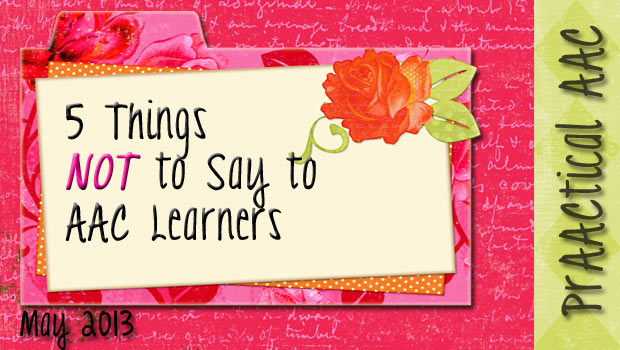5 Things Not to Say to AAC Learners

People who are learning to express themselves with AAC need to build their self-concept as competent communicators. One of the ways we can support that process is by being careful about the ways in which we refer to their communication. Here are a few things we try to avoid saying.
-
“Show me [on your device].” (Instead, build the language of communication, with directives such as “Tell me” or “Say it.”)
-
“Press the switch.” (Instead, refer to the function that the switch is being used for. E.g., “Make it go”) See Ian Bean’s great post on this subject.
-
“Tell me on your talker.” (If they tell you one way, and you understood the message…celebrate, reward, and encourage! If you make them repeat themselves using a different strategy, they may come to view communication using AAC as a chore. And that’s not so good for motivation…)
-
“I know you can do it. You did it yesterday. You’re just being stubborn.” (There are lots of good reasons for inconsistency but even if that wasn’t so, there is no room for calling someone stubborn in a professional context.)
- “Hurry up.” (Just. Wait.)
Filed under: PrAACtical Thinking
This post was written by Carole Zangari

10 Comments
No. 5 is my favorite sermon! 🙂
Great list!
Ha! You’re in good company there, Kim! We’re preaching this all the time to our grad students; Easier said than done. 🙂 Thanks for stopping by and taking the time to comment. Much appreciated!!
OK, first, Carole I didn’t realize this was your blog! SOO funny–read it and it wasn’t until I went to comment that I realized it was you. Which makes my comment of how happy I am about this blog post as I feel myself repeating these things all the time! Thanks and good to “see” you!
Chris
Autism Classroom News
Hey, Chris! Thanks so much for stopping by!! How funny!! Anyway, glad the post was of interest. Do you feel like a broken record sometimes? I know I do! Looking forward to seeing you in Orlando next month. 🙂
Great list! I’ve never commented before, but I just wanted to let you know how much I’m enjoying this blog. This blog and facebook page are what made us try AAC and what has being guiding us through these first few months!
I’d love to hear more about the reasons for inconsistency you mentioned in number 4. We find that what our son can say (verbally or on the talker) varies so much from day to day. It always bothers me when his therapists and teachers assume that just because he said something once he should be able to say it all the time. I’d love to hear your opinion on this in a future post.
Kristina, wow! Your comment that PrAACtical AAC blog and FB made an impact on your decision has us smiling from ear to ear!! I will write a post on the issue of inconsistency, but there are both neurological bases for it in some cases and also environmental considerations. We sometimes (wrongly) assume that the issue is one of ‘will’ (meaning they don’t want to do it) versus ‘skill’ (meaning that they do/don’t have the ability to produce a response in that moment). To be fair, I think it’s an issue that people don’t always understand so they misinterpret the child’s lack of responding as a behavioral trait. Thanks for giving me the idea to write about this. Now, if I could just free up some time…
Once had a director tell me that I should have had my student, who verbally said goodbye, say it again on her iPad. I calmly explained that we all use multi-modalities to communicate.
Bari, good for you for a) speaking up to educate him/her, and b) staying calm! I know it isn’t easy…
My son has a PDA profile so being directive as given in No. 1 make things worse. So I mostly say, do you want to use your talker to say something
Thanks for sharing that. It’s a good reminder to all that we have to be thoughtful in making decisions so that there is a good match between the strategy and the individual that we are trying to support.